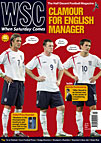 It’s not just managers who play the percentage game. The role of agents in football is once again under scrutiny, but Adam Powley wonders if the will exists within the game or the media to tackle the problem properly
It’s not just managers who play the percentage game. The role of agents in football is once again under scrutiny, but Adam Powley wonders if the will exists within the game or the media to tackle the problem properly
Many issues have been raised by Mike Newell’s dramatic contribution to the perennial saga of bungs. But amid all the outrage, one question has barely been asked: what exactly are agents for?
Many in the sport have greeted Newell’s claims with resignation and a collective shrugging of shoulders that this is how the murky business of modern football works. Few are prepared to break with the consensus that footballers need some form of representation and that agents are right for the job. Even the Crystal Palace chairman Simon Jordan, one of the most outspoken critics of the way some agents operate, concedes they have a role to play, a view given weighty substance by his shareholding in an agent’s company. But the question remains as to what place football’s middlemen should have.
Tom Bower, in his exposé of English football Broken Dreams, revealed a depressing picture of an industry infected with suspect practices. It begged an obvious question: why can’t club chairmen and managers just pick up the phone and talk to each other to sort out transfers or contracts, as they apparently used to before the advent of the Mr Fixits and ten-percenters?
Not surprisingly, agents have been vocal in their own defence. One line of reasoning is that they have helped to secure the cream of the world’s talent to play in Britain. It’s a superficially seductive argument, but arguably a self-fulfilling prophecy: agents are only required to oil the transfer wheels simply because agents have manoeuvred themselves into a position whereby they are perceived as integral to the process. After all, do footballing amateurs more used to the world of showbiz, or even those with some experience in the game, really know more about talent or potential than scouts and managers?
An agent’s primary function, however, is to serve the interests of players. The accepted wisdom is that naive young men, growing up in the closeted environment of football, are ill-equipped to deal with cut-throat negotiations and are ripe for exploitation by predatory club bosses. This ignores the fact that millions of other young people look after their own interests at work, either individually or collectively. But, if you accept that players do need help and advice, it is debatable whether agents are best qualified for the role.
In many cases, they work for a percentage commission, often demanded from clubs, with the really big money made when their player signs a new deal or moves. That inevitably means that revised contracts or transfers – in other words change – are in the financial interest of the agent, however much they protest that they always have their client’s “long-term future and stability” at heart.
There are alternatives. Players can appoint legal or financial advisers to represent them and pay an agreed fixed fee or an hourly rate for services rendered. Clubs can therefore avoid having to pay a fee to the agent (yet another conflict of interest in a sport awash with double-dealing). Such a scenario is not wishful thinking. Paul Scholes, one of the most successful and no doubt well rewarded of players in the last decade, uses an accountant to negotiate his wages and the deals are reportedly tied up within hours. There is also no reason why the Professional Footballers’ Association cannot negotiate on behalf of a player – and it does. Martin Keown, James Milner and Neil Mellor have all been represented by the PFA. Manned by ex-pros who know exactly what it is like for a callow youth to be confronted by hard-bitten businessmen, the PFA has its own in-house agency with the expertise and experience for looking after its members.
Agents are not by any means the only people to have seized an opportunity for self-enrichment via football and, indeed, if there are bent agents there have to be corruptible or toothless managers, players, directors and administrators. Far too many have been either complicit or drawn into the current mess. If that situation is to be remedied, it will require the determination of FIFA and national associations and leagues to enforce a worldwide cure.
It would also help if the media could pursue allegations of bungs and bribery more vigorously. Attempts have been made, but without clear, hard evidence of written agreements and payments, picking up the whiff of underhand deals often leads to false trails. In addition, it is doubtful whether some journalists have the stomach for a confrontation. With many reporters dependent on titbits of information from agents (one journalist told WSC that more than two-thirds of his leads come from agents), it’s no surprise that some hacks are cautious to bite the hand that feeds them.
Professional football has been open to corruption and exploitation since its inception. The days when a nod and a wink could smooth a transfer’s passage seem quaintly innocent set besides the multi-million-pound wheeler-dealing that now goes on behind the scenes. But, given the will of all involved, it doesn’t have to be quite so skewed in favour of the agent’s way of doing business.
From WSC 229 March 2006. What was happening this month